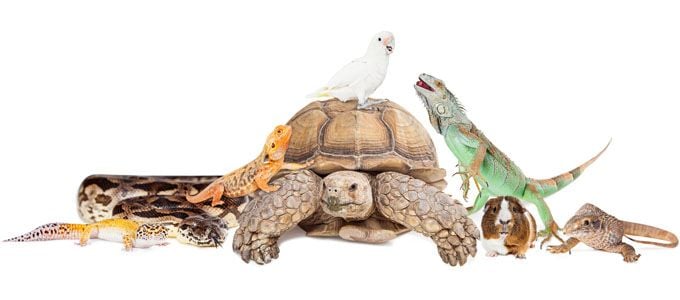Do Not Overfeed "Obesity is the most common nutritional disease seen in cats," says Joe Bartges, DVM, PhD at the University of Tennessee's College of Veterinary Medicine. It is a common bad habit for cat owners to feed their cats too much. Cats only need 24 to 35 calories per pound of body weight each
Read more

Cats and dogs are amazing pets to have, but you may be considering something a little more...exotic. Exotic pets may not be as popular as other animals that you are used to seeing as part of a family’s household, but they can be just as fun, rewarding, and easy to form bonds with!
Birds, for example, are highly intelligent animals that can be taught to or vocalize. Turtles, if provided the proper habitat and dietary requirements, can be another great addition to your home with their unique personalities. Reptiles are quiet, low-maintenance, scaly friends that can also offer you companionship without all the hassle. Read more below to discover what type of care each of these animals needs and if they’re right for you.
-
6 Rules to Improve Your Cat's Diet
-
All About Hairballs
Does your favorite feline leave you hairballs as gifts? If so, you’re not alone. Although we love cats for being meticulous groomers, it’s safe to say we don’t like finding hairy presents around the house. Let’s explore what causes hairballs and how to prevent them. What Causes a Hairball? Hairballs
Read more -
5 Ways to Protect Your Dog's Hearing
The acuity of your family dog's hearing far surpasses that of humans. Hearing is a critical sense to dogs, and when diminished, will increase dependency on the sense of smell. When a dog hears something, he can hear it without moving his head. Many muscles surrounding the ears help dogs get premium sound
Read more -
Captive Reptiles May Have Nutritional Deficiency
Pet owners keeping reptiles in captivity as household pets may sometimes find that their pets have a nutritional deficiency. Metabolic bone disease is "the most common nutritional deficiency affecting captive reptiles," advises veterinarian Fredrick L. Frye in Reptile Care: An Atlas of Diseases and Treatments.
Read more -
Bringing Dog Vision in Focus
Veterinary ophthalmologists are often asked, "How well do animals see?" Visual function involves a combination of many factors, including: the field of view, depth perception, acuity, perception of motion, and color differentiation. All of these functions must then be integrated by the brain to produce
Read more
74of103


